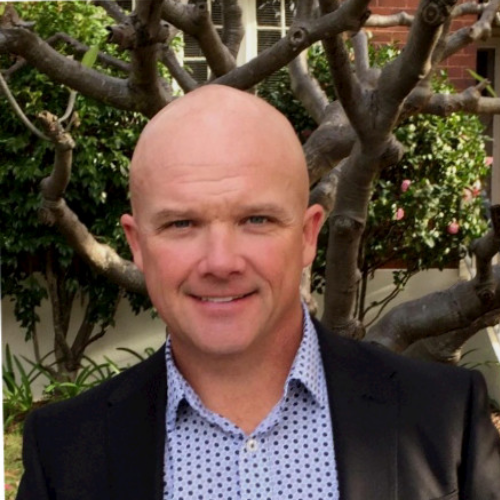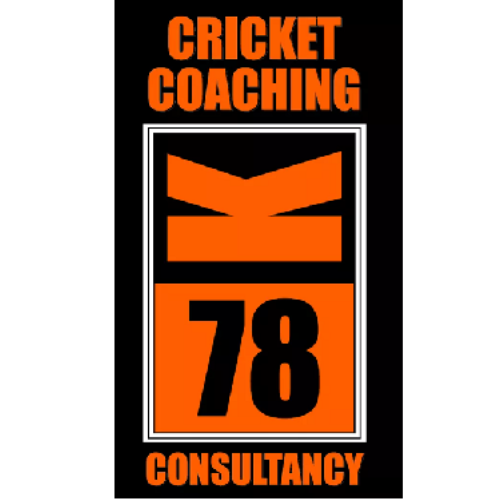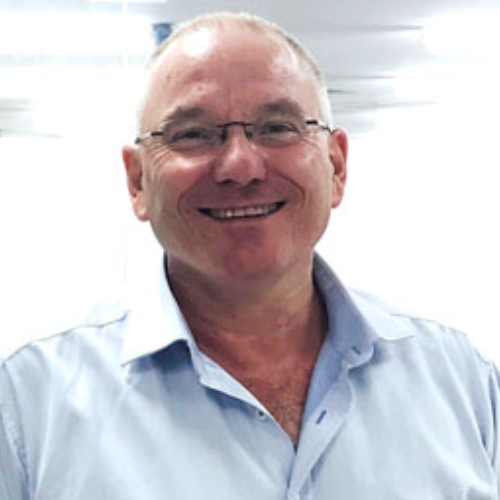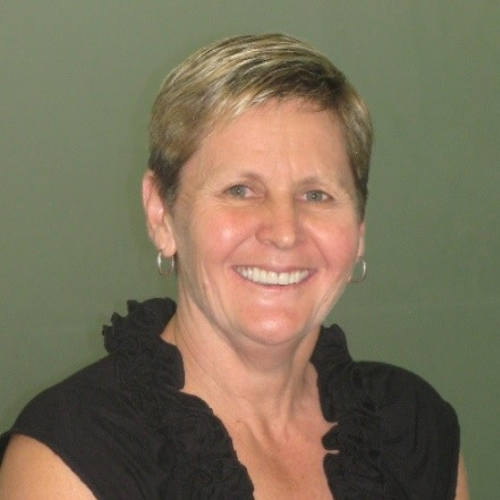Steve Herzberg was a cricketing journeyman. In a unique career Steve played 21 First Class games for Western Australia, Tasmania, Kent, Worcestershire and Somerset.
Steve was a resilient, highly skilled off-spinner and handy lower order batsman who made his first-class debut for Western Australia against NSW at the SCG in the 1990/91 season.
He took 47 wickets at an average of 38.57 with best figures of 5 for 33. With the bat he scored 384 runs at an average of 21.88 and his highest score was 57.
A genuine student of the game Steve was a highly respected team mate.
Steve is the Director of NRG Solutions, a successful Sydney based corporate training and business coaching company, which he established in 2005.
Welcome Steve
How did you get into cricket?
My dad, Louis, loved the game. I owe a lot to him and my 2 brothers for my involvement in the game. Cricket was often on TV and our house had lots of cricket books. From a young age I spent hours playing COTB (Cricket out the Back) with my brothers.
What are your memories of your junior cricket days?
We moved to Perth in Western Australia, from England when I was nine years old. From the age of 9, I started playing junior club cricket for Nedlands CC (Now Claremont-Nedlands).
The first game I played was for Hollywood Under 12’s. The only success we had that day was winning the toss. We batted first and were bowled out for 3. I equal top scored with 1. James Pyke (went on to play for SA) took six wickets in over without taking a hat trick. (8 ball overs in those days). I have great memories of Junior Cricket. You had to retire at 30, which was always a goal of mine and could bowl a maximum of 5 overs. I started as a pretty average seamer and then around the age of 13 started bowling offies.
When did you come to grade cricket? How did it come about?
After Under 16’s. I started in the 4th grade side at Nedlands. In my first game, I foolishly took 3 catches at short leg. It took me most of the season to get out of there.
How did you progress through the grade ranks?
Steadily. Nothing dramatic. I think I had one season in 4ths, then thirds, then seconds. I was a steady performer, certainly didn’t dominate in the lower grades.
Did you have any mentors or coaches who were assisted your cricket and if yes how did they help you?
I played under two excellent captains when I was playing lower grades at Nedlands. Kevan “Poo” Penter and Brian “Spanner” Hannah. They were both great communicators who had played a lot of cricket. I learnt a lot by watching how they played, trained, captained and dealt with the differing personalities in the side. Darryl Foster (coach) encouraged me when I was trying to break in to the WA side and coached me at Kent.
Other players who helped me include lesser known guys, but great club men; Andrew Keily, Vince Rule, Mark Palmer, Alistair Storie (Scotland) and Brett Mulder. I also learnt a lot from playing with Graham Wood at UWA (not how to run between the wickets) and Ken Macleay.
As a Mentor, Ashley Mallett had a big influence on me. He gave me excellent advice. In the days prior to email, he would write to me with suggested fields, tactics and all-round advice. I liked his humour and his stories. His wit is as dry as bone. He’s also an excellent author.
What were your cricketing ambitions?
Initially to play for WA, then as I got older to play County Cricket. Ultimately, I wanted to be the best player I could possibly be.
Describe the circumstances the led to your Sheffield Shield selection for WA?
I left Nedlands CC at the age of 20 in search of more first grade opportunities. I moved to University of WA. It was a great move for me. My game had developed through playing a few seasons in England and I felt I needed to be playing first grade regularly. WA had a habit in the late 80’s / early 90’s of not playing specialist spinners at home. The WACA was better suited to quick bowling. Wayne Andrews, who was a very good number 6 batsman could get through a few handy overs of spin if required. Sometimes Tim Zoehrer would take the WK pads off (hand them to Mike Veletta) and bowl some tidy leggies. Specialist spinners were only really looked at for the trip to Sydney to play NSW. I had a good season in grade cricket in 1990/91 and managed to get picked to make my first class debut v NSW at the SCG that season.
What do you remember about your first-class debut?
A few things. 1. Fielding at silly point while Terry Alderman bowled. Every ball seemed to land on the same spot on the pitch. 2. Justin Langer saying to me that I would have a good game because all the guys I was playing against were very good grade players, just like me. 3. Taking 3-33 on my first day with Mo Matthews being my first wicket hitting a waist high full toss straight to Marto. 4. Getting Trevor Bayliss caught at Bat Pad in the second dig by Mark Lavender. 5. Greg Matthews talking in gibberish both to himself and to anyone else within earshot.
What were the challenges of playing first-class cricket? How did you deal with them?
Plenty of challenges. 1. Constantly questioning myself if I was good enough. There were no contracts in Australia when I started. 2. Wondering far too much about what I would do when I finished playing cricket. 3. Having my future in someone else’s hands (selectors). 4. Convincing my captains that I should be batting higher and bowling more! In terms of how I dealt with the challenges, on reflection, I should have been a bit tougher. I should have assembled a stronger support team around me to take the burden off dealing with the challenges alone.
What prompted your move to Tasmania?
I couldn’t see a future as an Off Spinner in WA. I had played twice (a year apart), with both games at the SCG. I was all set to move to Melbourne and try my luck there, which I thought would be good for both my cricket and non-cricket career (I have a Business Degree). There was a small article in the winter in the Sunday Times in Perth about the state squad for the upcoming season. Shippy (Greg Shipperd - Tassie coach) read it and saw that I was planning on leaving WA. He suggested Tassie might present better opportunities for my cricket. He put forward a case at the right time. Before I knew it, I’d packed my bags and went to Tassie.
What are your recollections of your time in the Tasmania team?
Making my debut for Tassie v NZ and taking 4 wickets in the game. Playing with Boonie. Great to start getting a regular game in a state side. Watching a 17-year-old Ricky Ponting bat. Rooming with Atko (Mark Atkinson). Being bounced a lot in the nets by Chris Matthews. Playing with some great guys like Jamie Cox, Colin Miller, Dene Hills and Michael DiVenuto.
You also played county cricket for Kent, Worcestershire and Somerset? How was that different to the Sheffield Shield? And what did you learn?
I was lucky to be able to county cricket having been born in England. I learnt a lot about my game and the game in general through my 7 seasons in the UK. (5 in England and 2 in Scotland). Winning wasn’t as important as it seemed to be in Australia. A draw was often seen as a good result. Playing in different conditions each week helped my game immensely. Everyone says in England “It’s a long season”. Yes, it is. At times it was hard to remain enthusiastic. The overseas players added another element. I was lucky enough to share a change room with Aravinda De Silva at Kent and Mushtaq Ahmed at Somerset. Two brilliant cricketers.
Is cricketing journeyman a fitting description of your career?
Definitely. I was willing to move around to try and sustain a career as player. I had to back myself. In hindsight I should have backed myself more, listened more attentively and played every game like it was my last one. The benefit of being a journeyman was the fact I was able to meet so many terrific people. I’m fortunate that I still have friends I’ve met through the game in different parts of the world.
What do you think looking back on your first-class career?
Glad I played. Some special memories. Playing for Somerset v Australia at Taunton in 1997. Taking 5-33 in 1995 on my debut for Kent V Leicestershire. Getting a wicket with my first ball for Somerset v Surrey at the Oval. More than anything though I met some great people from very different backgrounds, some of whom have become lifelong friends.
I wish my batting and bowling averages were reversed. (23 with the bat, 38 with the ball). Overall, I don’t really dwell on my playing career now. It’s almost 23 years since I finished. I’ve moved on. I’ve recognised the benefits of playing professional sport post playing. Critical life lessons such as; accountability, dealing with different people, leadership, resilience, not making excuses, decision making all stem from my time in the game.
What preparation went into your game? And why?
I used to love training. I bowled a lot each week when I was playing first class cricket. Often bowling alone in some obscure park or field with a tea towel placed on a good length. I’d talk to myself quite a lot as I did this. As I got older, I started to work more on my fitness. I should have spent more time on this and more time learning how to hit the ball off the square when I batted! Towards the end of my playing career (I stopped at 30) I had developed some very good mental skills. In terms of why, I felt I needed to practice a lot to stay sharp. In hindsight, if I’d have practiced slightly less, yet at a higher intensity, I may have become a better player.
Who were the teammates you particularly admired and why?
In Australia in no particular order. Justin Langer – work ethic and focus. Ricky Ponting – Talent and positive approach to the game. Damien Martyn – Balance and grace. Mark Atkinson – determination and application
In England – Aravinda De Silva – Genius, a pioneer and a humble man. Mushtaq Ahmed – Skill with the ball beyond belief and positive outlook.
Who were the opponents you particularly admired and why?
Greg Matthews – Street fighter and an excellent off spinner. Mo just loved the game and the contest. I always enjoy my chats with Mo and still only understand 25% of what he’s talking about.
Michael Bevan – Great player in Shield Cricket and ODI’s. Bevo was a beautiful player of spin, especially on slow turning SCG tracks. I remember finally getting him out once and was wrapped. He made 140!
What would you do if you were running Australian Cricket?
How long have you got? Here’s 4 points.
1. Spend more money on nets and small playing courts that look great and are fun to play in, (in public spaces), where kids can just go and have unstructured play.
2. Prioritise Test Cricket in the calendar, ensuring it’s the premium offering in the game.
3 Have a strategic review of T20 cricket. Is it necessary? I don’t see other sports making major changes to the way they are played. The fast food fan with a bucket on their head will soon find something else more appealing. The essence of cricket is the balance between bat and ball. I’d keep a very close eye on baseball. Last time I checked they are hardly modifying the game. It still remains relevant to today’s sports fans.
4. Get rid of at least 50% of the administrators and marketers employed in the Cricket. Use the dollars saved to be pumped back in to better all access facilities (see point 1) and more cricket comps and activities for public schools.
What advice would you give to yourself as an 18 year old?
1. Listen more. 2. Be a more aggressive batsman. 3. Work harder on my upper body and shoulder action to get more revs consistently on the ball. 4. Laugh a lot. 5. Ensure you always have balance, interests and friends outside of the game.6. Invest my own money in to having a non-judgemental coach who can be there to support me throughout my career.
Join the cricket network to promote your business and expertise. Make it easy for people to search and find the people and services they need through people they know and trust.
Join the network







